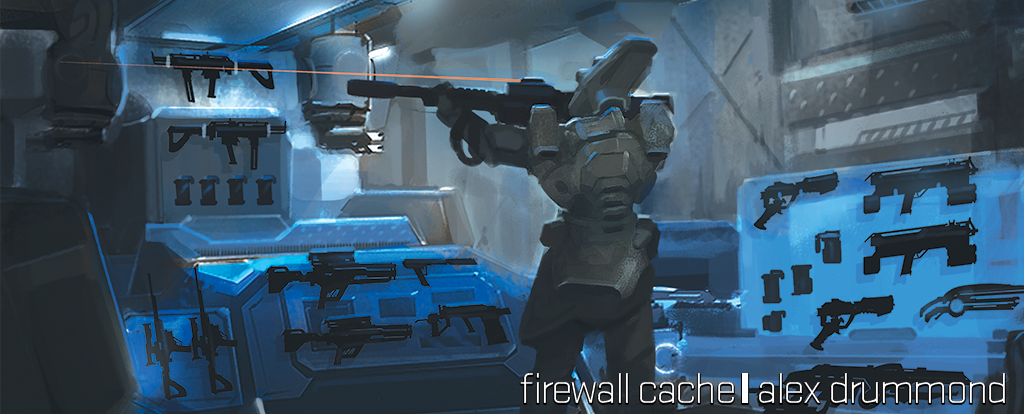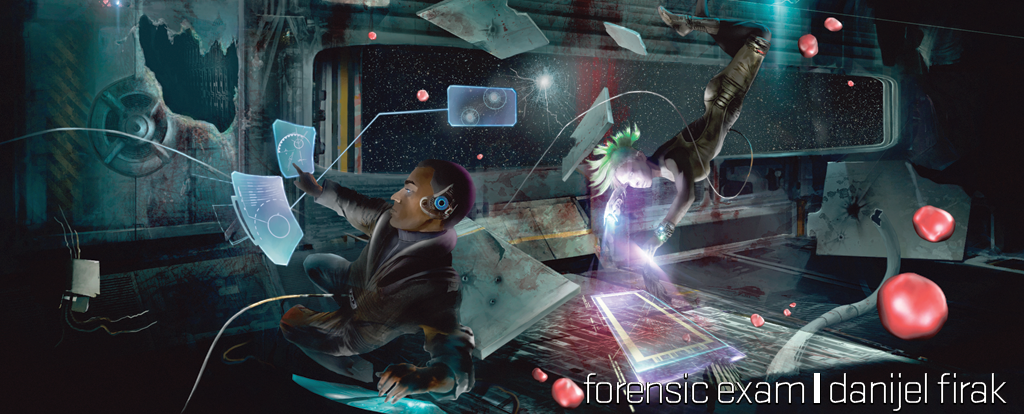Not sure how to best deal with Morph Points (MP) and Gear Points (GP) in an ongoing campaign? Here’s a closer look at assigning and spending them!

Refresher/Overview
The system of Morph Points and Gear Points in Eclipse Phase Second Edition (EP2) works like this: for each scenario, the GM assigns a number of MP and GP to each character. The default is 6 MP and 20 GP, but GMs are encouraged to alter this according to the mission specifics. MP are used to acquire the morph for that mission, and any extra can be spent as GP. GP are used to acquire gear.
Characters with the Resources trait add the level of that trait to each of their MP and GP totals. They can also spend rep favors to acquire more points.
During the scenario itself, PCs can also use their Resources trait, rep favors, and nanofabrication to acquire additional gear. If a PC dies during a mission and needs to resleeve, they get their full MP allotment reduced by 1 — this is cumulative for multiple resleeves.
What happens at the end of the mission depends on the campaign. If the PCs stay in the same locale, they can keep their morphs and gear. If they farcast away, they either trade it in, sell it, return it to the autonomist commons, or stash it. During downtime between scenarios, PCs also have the option of using their time to acquire GP/gear.
Styles of Play
First, let’s discuss game-play styles. EP2 is designed specifically for an episodic style of play. That is, the PCs are recruited for a mission, they get their morphs and gear, they run through the scenario, and then they get some downtime before the next mission. This is an ideal style of play for one shots, convention games, and gaming groups that engage in shorts bursts and then take some time off or switch to another game. It also works for longer campaigns as long as the GM chops it up that way.
We use this setup because many missions involve farcasting to a specific location, resleeving, and doing the op—meaning that they leave their previous morphs and gear behind and need to re-equip at their new location. It fits for Firewall sentinel teams, in the sense that they are described as being on-call, going about their usual lives and affairs (the downtime part) but every so often Firewall calls them up to handle a problem. And it works for gatecrasher teams, who have time off in between gate operations.
Not every group plays this way, of course, and so that’s where some of the complications with MP and GP arise. Some games are more linear/on-going, with downtime measured in days or weeks at most between scenarios, rather than months. Some linger in specific locales rather than hopping around the setting. This raises questions about keeping the same morphs and gear while replacing losses and handling the resources available for a new operation/scenario.
Even episodic play may have some wrinkles with MP/GP. Not every episode is created equal; some are simply longer, more resource-consuming. Some are more lethal, requiring multiple resleeves (with dwindling MP). Others require frequent farcasting with the PCs not always having the option to “trade in” the resources they left behind. This is balanced out somewhat by the fact that PCs can use their Resources traits, rep favors, and nanofab to acquire what they need during a mission, but on particularly long or dangerous ops, the GM may need to take further steps.
Breaking Down an Inherent Assumption
Both MP and GP represent an abstraction—they are an approximation of the general resources the team of PCs has available—to simplify book-keeping and resource management. It also provides the GM with an opportunity to tailor each scenario by making these assets limited or abundant.
This assumption is based on the idea that the PCs have some sort of patron. Usually this is Firewall, but it could also be the gate mission’s sponsor, a criminal cartel or gang, or any other faction or backer, from anarchist groups to oligarch. The nature of this patron and the mission theater impact the MP/GP available: autonomists may have pull on the rim, but don’t have many credits or sway in the inner system. Hypercorps and oligarchs have deep coffers, but may not want to tip their hand to rivals, and their outer-system reach is restricted. Brinkers may have limited resources for payouts, whereas cartels are flush with cash and debts owed.
Rather than a specific patron, the MP/GP available could also just represent the personal resources the PCs have, though this is more delineated by the bonuses to MP/GP you can add from the Resources trait and rep favors.

Alternative Options
Let’s examine some ways you can tweak MP/GP assignments for non-standard situations. While the nebulousness of the MP/GP abstraction can make it challenging for non-episodic games, its fluidity is also its strength, because it gives the GM a lot of power and a lot of options for influencing the game.
Inserting Reset Points
The first option is also the most obvious: for non-episodic campaigns, and for episodes that extend longer or are more dangerous than normal, simply break them down into episodic chunks. Identify good pauses in the story or transitions between story beats and treat that as a mission “reset” point. Ideally you want this to be a point where the team has a day or at least a few spare hours to resleeve, scrounge gear, etc. Not every PC will feel the need to switch out their morph or gear allotments, but some will appreciate the option. Importantly, for deadlier missions, this can simply be an MP reset point, where the dwindling spiral of MP available for resleeving resets to its full value (or at least a higher one). Narratively, this can be explained away as installment payments, accessing reserves, emergency funding, the patron scrounging assets together to support the team as the mission nears its end, etc.
It’s important to balance these resets out with the needs and background of the mission. If the team’s patrons are effectively poor or without resources, resets may be minimal at best. On the other hand, if the PCs just helped a hypercorp score a windfall over a rival, they may find their mission budget has increased. The MP/GP allotted for this reset do not need to be the full value as they were at mission start. The team’s patrons may simply be funneling them assets for morphs alone. For gear especially, you may just want to give PCs the option of switching their gear out for gear of an equivalent GP—essentially retooling their haul for the next part of the mission.
Setting a Periodic Refresh Rate
Another good option for non-episodic campaigns is to set a refresh rate for MP & GP. For example, every week, a bit more MP/GP becomes available to the team. This can either be spent on a weekly basis or banked up.
How do we determine the refresh rate? Well, let’s first assume that on average a scenario episode takes up 1–3 weeks of game time, followed by anywhere from a week to a few months of downtime. For simplicity, let’s ballpark that at about 6 weeks per episode. With an average MP allotment of 6 and GP of 20 per episode, that’s roughly 1 MP and 3 GP per week. This rate should be adjusted to reflect the campaign, patrons, etc.
This option works best for campaigns focused in a particular locale, with multiple ongoing plot lines, and where the team’s sponsors either vary or are non-existent (i.e., the team pursues its own agenda). The refreshing MP/GP in this case represents ongoing payouts/backing from current patrons, side work, and the rewards of the characters’ own actions. With this in mind, the refresh rate can and should change from week to week, reflecting changing conditions.
GMs using this method should watch out for players that decide to hoard their points. Either place an upper limit on the total number of points available or rule that points that aren’t spent within a certain time period are lost.
Adding Resources as Story Rewards
GMs can also base any extra MP/GP allotments entirely on the actions of the PCs. This works well for almost any type of campaign. In this situation, the PCs earn extra resources whenever they accomplish specific mission goals. There are two methods of going about this.
The first method is to make these reward points arbitrary, simply representing progress on the mission or beats in the story. For example, a current plot line that involves the PCs investigating an act of sabotage, uncovering a larger plot to destroy a habitat, and then tracking down and dealing with the exhumans responsible could be broken down into those 3 designated parts. As the PCs complete each component, they are rewarded with a small amount of MP/GP for the next part of the plot. This system works well when the PCs are tangled up in multiple plot lines at once, making progress on each incrementally or in fits and bursts. Since there are fewer “stop points” in more involved campaigns like this, these rewards help pace out the resources available to the PCs over time.
The second method is to make the rewards representative of actions that would earn payouts, bonus pay, accolades, social capital, or other assets and resources. For example, if the PCs capture a wanted criminal, they might get a bounty. If they help save a habitat, they might benefit from the locals’ good will (in addition to standard rep score boosts). This style represents a more “realistic” approach to the abstraction of MP/GP resources, but it does limit the rewards to situations that would actually provide the PCs with tangible benefits.

Resource Banking
A final alternative for MP/GP in non-episodic campaigns can be considered as a sort of austerity system, where you enforce the default rules in a non-episodic campaign. With this method, MP/GP are only allocated when the PCs are given a particular mission from a sponsor. The rest of the time, they must rely on their own Resources traits, rep favors, nanofab, and downtime actions to generate GP/gear.
Depending on how you run your campaigns, this can stretch the team’s assets thinly. If the campaign is heavily driven by the PCs and their own actions, there are likely to be fewer situations where a patron approaches them with a job to do and the resources to do it with. The PCs will need to more carefully manage their gear to get what they need. This will spur them towards trading in and selling off unwanted things, as well as spending more time fabbing. However, it will also drive them to acquire morphs and gear via other methods, which can help spur the story forward. This kind of game can require more effort to keep track of things for both players and gamemaster, but it particularly works well with inner-system, brinker/pirate, and crime-focused campaigns where the struggle to survive and acquire resources is more central to the story.
GMs running this style of campaign may want to consider an exchange option where GP can be traded in for Morph Points.
A Few More Thoughts
The relation between Resources trait and MP/GP is a narrow one. In a way, MP/GP represent the Resources held by the team’s patron, except the rules allow it to be exploited in a broader manner. With some of the methods noted above, particularly the reward system, increasing a character’s Resources trait might be a better option than giving extra MP/GP. Resources, of course, works best in inner-system settings, so a boost to rep scores works as the outer-system alternative. You could also have certain parties owe the PCs favors that are paid out in the same way as rep favors, without costing as a regular favor expenditure.
There are a few other issues that tie into MP/GP that are beyond the scope of this article: hoarding gear, fab-wild PCs, overgrown blueprint libraries, excessive morph loss, etc. Some of these issues are discussed in the gear and GM sections of Eclipse Phase Second Edition.
When we delve further into gamemastering advice, what would you like to hear about?
Our Patreon project supports these articles and other bite-sized Eclipse Phase material — join up to help guide the game line, playtest, and more!
Check out our Discord server is also a great place to talk to both fans and the _Eclipse Phase_creators.
